Abortion
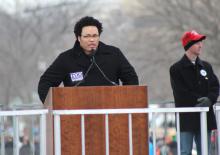
WASHINGTON — Standing before the throngs at the March for Life on Jan. 25, Ryan Bomberger admitted that he was the poster child for one of the most difficult aspects of the abortion debate: his mother had been raped.
“I’m the fringe case that even pro-lifers have a hard time embracing,” said Bomberger, an anti-abortion activist whose mother chose to continue the pregnancy and put him up for adoption.
Forty years after the Roe v. Wade decision legalized abortion, children who were conceived through rape — and women who were raped and chose to end the pregnancy — are speaking out, opening a new front in the often-fraught discussions of a decades-old culture war.
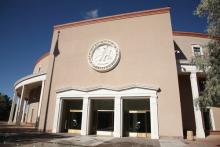
A New Mexico lawmaker has drawn fire for proposing legislation to classify an abortion after a sexual assault as “tampering with evidence.”
Critics pounced on House Bill 206, introduced Wednesday by Republican state Rep. Cathrynn N. Brown, saying victims of sexual assault could be charged with a felony if they sought an abortion after rape or incest. But Brown said Thursday that the legislation was aimed at attackers, not victims.
“House Bill 206 was never intended to punish or criminalize rape victims,” Brown said in a statement. “Its intent is solely to deter rape and cases of incest. The rapist — not the victim — would be charged with tampering of evidence.”
“New Mexico needs to strengthen its laws to deter sex offenders,” the statement added. “By adding this law in New Mexico, we can help to protect women across our state.”
Brown said she would amend her legislation to make the intent clearer, the Albuquerque Journal reported.
When thousands of abortion opponents gather Friday on the National Mall for their annual protest march, they will be united in their fierce passion for ending a procedure that the Supreme Court legalized 40 years ago in the controversial Roe v. Wade decision.
But they will also be more divided than ever on how best to rally people to join their cause: shock them with harsh slogans and graphic images of mangled fetuses, or convince them with reasonable arguments and affecting ultrasound images.
If activists are going to the March for Life “to display graphic photos or videos of aborted babies,” Simcha Fisher wrote this week in the National Catholic Register, a conservative outlet, “I’m begging you to reconsider.”
Evangelicals haven't always been part of the pro-life coalition. Prior to Roe v. Wade in 1973, the Southern Baptist Convention passed a resolution supporting abortion in certain circumstances. After Roe allowed any abortion for any reason, evangelicals began to change their stance and with Catholics formed the pro-life coalition we know today. The Washington Post reports:
The reality of abortion on demand and exposure to the logic of the abortion rights movement led to a fundamental shift in the evangelical conscience. By 1976 the Southern Baptist Convention would declare every abortion to be a “decision to terminate the life of an innocent human being.” Similarly, the large evangelical movement would develop an overwhelming pro-life consensus, seeing abortion as a great moral evil and a threat to the dignity of all human life.
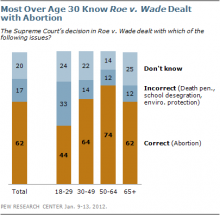
In the past four decades, American attitudes have changed markedly on gay marriage, smoking, bullying, and a host of other cultural issues.
But on Roe v. Wade, the 1973 Supreme Court decision that legalized abortion, public opinion today looks much as it did back then.
When it comes to American views on the legality of abortion, “the trend lines look about as flat as they can be,” said Daniel Cox, research director at the nonpartisan Public Religion Research Institute.
Just a few years after the justices decided Roe, Gallup pollsters began asking Americans about abortion. In 1975, 54 percent said it should be legal only under certain circumstances; last year, that figure was virtually unchanged, at 52 percent.
And the Pew Forum on Religion & Public Life this month found that 63 percent of Americans don’t want Roe overturned, a mere 3-percentage-point increase from 1992.
In more recent years, opinions on the morality of abortion have remained similarly stable, with about half of Americans (47 percent) calling it “morally wrong” and four in 10 considering it “morally acceptable” or “not a moral issue,” according to Pew.
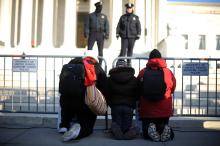
This is a memorable week: on Monday the inauguration of President Obama on the holiday honoring Martin Luther King, Jr., and today, the 40th anniversary of the Roe v. Wade decision by the Supreme Court. Some people will celebrate all three with thanksgiving. Others will find nothing to celebrate – especially the decision of January 22, 1973 that struck down state laws banning abortion.
Another Inaugural Address
On Sunday, there will be another inaugural address – this one by Jesus at the beginning of his ministry (Luke 4: 14-21). After 40 days in the wilderness facing the devil, Jesus returned to his hometown of Nazareth and went to the synagogue. He took his place at the reading desk and someone handed him the scroll of Isaiah. The text says he “found the place where it was written.” Jesus read the text, handed the scroll back to the attendant and sat down. Everyone was looking at him – all those hometown folks who knew him as a child. Then Jesus said, “Today, this scripture has been fulfilled in your hearing.” That must have been a shock because the Isaiah text Jesus read proclaims more than anyone could see: good news to the poor, release to the captive, recovery of sight to the blind, freedom for the oppressed – and the year of the Lord’s favor. The hometown folks would have recognized the year of Jubilee when debts would be cancelled, slaves set free and the land allowed to rest. Jesus was making a very big claim!
How shall we interpret what Jesus said in light of our deep divisions over abortion? Is the fetus in the womb oppressed or is the pregnant woman denied choices oppressed? Is the woman captive to laws that restrict her access not only to abortion but to contraceptives? Or is the fetus a captive threatened with death? We have grown so accustomed to shouting slogans at one another that it has become almost impossible to have faithful conversations across our differences.
Four decades after Roe v. Wade, the landmark Supreme Court ruling that legalized abortion, many opponents of the decision are in a celebratory mood while those backing abortion rights are glum, feeling that momentum is turning decisively against them.
Yet in reality, little has changed in the fiercest and most protracted battle of the nation’s bitter culture war.
Instead, what’s really going on is a case study in the psychology of movement politics, where activists have to rally supporters with cries of alarm without making them despair that all is lost. At the same time, they must offer evidence that their efforts are paying off without leaving them complacent.
It’s a difficult balancing act, and lately the abortion rights camp has been the one to sound the warnings.
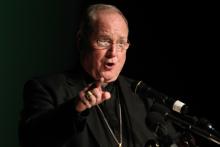
BALTIMORE — After sweeping setbacks to the hierarchy’s agenda on Election Day, New York Cardinal Timothy Dolan on Monday told U.S. Catholic bishops that they must now examine their own failings, confess their sins and reform themselves if they hope to impact the wider culture.
“That’s the way we become channels of a truly effective transformation of the world, through our own witness of a repentant heart,” Dolan, president of the U.S. Conference of Catholic Bishops, told the 250 bishops gathered here for their annual meeting.
“The premier answer to the question ‘What’s wrong with the world?’ is not politics, the economy, secularism, sectarianism, globalization, or global warming … none of these, as significant as they are,” Dolan said, citing many of the issues that have become favorite targets of the hierarchy.
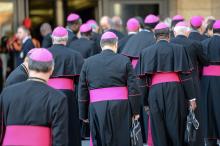
As the bishops gather in Baltimore this week for their annual meeting, they like everyone else in the country will be talking about last week’s election. The U.S. Catholic bishops took a beating at the polls. Not only was President Obama reelected, despite their attacks on him, the bishops also lost on state referendums on same-sex marriage.
Like all Americans, the bishops have a constitutional right to participate in the political process. They can debate the issues, criticize candidates and publicly express their views. They can even endorse candidates as long as they don’t do it on church property and don’t use church funds in supporting a candidate or party. In fact, they can even run for president as did Rev. Pat Robertson and Rev. Jesse Jackson. The U.S. Constitution does not forbid this; Roman Catholic canon law forbids it.
But what is constitutional is not always effective or prudent. Clearly the political strategy of the bishops is not working. A majority of Catholics voted for Obama and gay activists won every referendum. The Missouri and Indiana Republican senatorial candidates, who took the toughest positions on abortion, were also defeated when the Republicans were expected to win these races.
So where do the bishops go from here?

Most people in America, whether they are religious or not, prefer consistency in the faith community to hypocrisy. One of the reasons the fastest growing demographic in religious affiliation surveys is now “none of the above” is that too many people see more religious hypocrisy than consistency.
Religion is not, at its core, politically partisan. But too often religion becomes a political tool; and we see that on both sides of the aisle. That does not mean people of faith shouldn’t have strong convictions or feelings about political issues or shouldn’t vote one way or another; or that there is a moral equivalency between the political parties and it doesn’t matter which way we vote. Elections are important, and people of faith should be voting as citizens and by their most basic values.
But let’s be clear: On Nov. 6, neither a Republican nor Democratic victory will bring in the Kingdom of God.

On Tuesday, the religion, policy, and politics project at Brookings and the Public Religion Research Institute (PRRI) hosted a forum to release PRRI's fourth American Values Survey (AVS), a large national, multi-issue survey on religion, values, and public policy.
We sent some of our interns to listen in on the findings. Here's what they thought about some of the issues raised by the report.
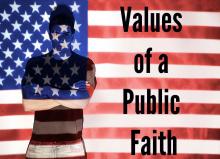
Editor's Note: This is part two of a three-part series from Dr. Miroslav Volf an a voice instructing us how to involve our values into our present politcal debates. To read part one go HERE. From part one:
In this year of presidential elections, I have decided to summarize key values that guide me as I decide for whom to cast my vote. ...
6. The Poor
Value: The poor — above all those without adequate food or shelter — deserve our special concern. (“The moral test of government is how it treats people in the dawn of life, the children, in the twilight of life, the aged, and in the shadows of life, the sick, the needy, and the handicapped” [Hubert Humphrey].)
Rationale: “When you reap the harvest of your land, you shall not reap to the very edges of your field, or gather the gleanings of your harvest; you shall leave them for the poor and for the alien: I am the LORD your God” (Lev. 23:22). “There will, however, be no one in need among you, because the LORD is sure to bless you in the land that the LORD your God is giving you as a possession to occupy” (Deut. 15:4).
Debate: There should be no debate whether fighting extreme poverty is a top priority of the government. That’s a given. We should debate the following: How should we generate a sense of solidarity with the poor among all citizens? In poverty alleviation, what is the proper role of governments and of individuals, religious communities, and civic organizations? What macroeconomic conditions most favor lifting people out of poverty? What should the minimum wage be?
Questions to Ask: Is overcoming extreme poverty (rather than fostering the wellbeing of the middle class) a priority for the candidate? For what poverty-reducing policies is the candidate prepared to fight?
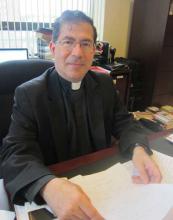
NEW YORK — A year ago, the Rev. Frank Pavone was facing an existential crisis in the unlikeliest of places.
The longtime head of the anti-abortion group Priests for Life, Pavone had been confined to the Diocese of Amarillo by his bishop, Patrick J. Zurek, who sent a letter to every other U.S. bishop declaring that he had so many concerns about the group’s $10 million budget that Pavone shouldn’t be trusted with donors’ money.
Pavone’s backers were stunned, and many stopped giving, which only exacerbated the problems that helped get Priests for Life into trouble in the first place. Pavone also couldn’t go on the road to reassure funders and drum up desperately needed cash.
Instead, the New York-born priest was stuck in a convent in the Texas panhandle where he served as chaplain to an order of nuns in a place called Prayer Town, a virtual prisoner in a war of words with Zurek, who had blasted his “incorrigible defiance of my legitimate authority as his bishop.”
What culture war? At a survey release of young evangelicals and proceeding panel discussion, common ground was the pervading theme.
While panelists ranged in religious and political backgrounds — representing groups like Young Evangelicals for Climate Action, World Relief, Family Research Council, USAID, World Vision, the Manhattan Declaration, and Feed the Children — there was an overarching agreement that while young evangelicals are largely pro-life, life issues now extend to beyond the typical to things like creation care and immigration.
“There is still a lot of tension that many young people feel in trying to identify with one political party or the other,” Adam Taylor, vice president of advocacy for World Vision. “… There is a real deep commitment to a pro-life agenda, but that agenda has now expanded and includes a core and strong commitment to addressing issues of poverty.”

WASHINGTON — A coalition of evangelicals is calling on fellow Christians to support access to family planning across the world, saying it does not conflict with evangelical opposition to abortion.
The centrist New Evangelical Partnership for the Common Good released a 15-page document on Monday calling for “common ground” support of family planning and the health of mothers and children.
“We affirm that the use of contraceptives is a responsible and morally acceptable means to greater control over the number and timing of births, and to improve the overall developing and flourishing of women and children,” said the Rev. Jennifer Crumpton, one of the advisers to the evangelical group.
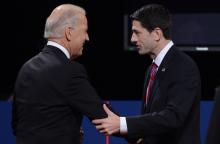
Catholicism’s social justice teachings have often been called the church’s “best-kept secret,” and after the Oct. 11 vice-presidential debate between Joe Biden and Paul Ryan – the first such showdown between the first two Catholics to oppose each other on a national ticket – that may still be the case.
While moderator Martha Raddatz earned kudos for her performance, her only question about the candidates’ shared Catholic faith came near the end of the 90-minute debate, and she framed it solely as a question of how their faith affects their policies on abortion rights.
That was seen as a victory for Catholic conservatives and Republicans who want to reinforce the image of the church as a “single-issue” religion – that issue being abortion – and a setback for liberal Democrats and others who have struggled to highlight the church’s teachings on the common good as central to Catholicism’s witness in the public square.
“What a lost opportunity!” wrote Michael O’Loughlin at the blog of America magazine, a national Jesuit weekly. “If the moderator planned to discuss faith, and I’m glad she did, why limit the discussion to one issue, however important, when the full spectrum of Catholic social teaching is ripe for an expansive and thought provoking conversation?”

The white working class, a potentially rich bloc of voters for Republicans or Democrats, hasn’t settled on Mitt Romney or President Barack Obama, a new study from the Public Religion Research Institute shows.
“These white working class voters are not particularly enamored of either candidate,” said Daniel Cox, PRRI’s research director. “In terms of their favorability, they’re both under 50 percent.” Forty-four percent look favorably upon Obama and 45 percent upon Romney.
Released seven weeks before the election, the August survey found Romney with a double-digit lead over Obama among the white working class, which preferred the GOP candidate 48 to 35 percent.
But Cox points out that the gap narrows to statistical insignificance among women voters in this group, and in the Midwest and West, home of several swing states. The upshot for Romney and Obama?
If they want to woo this group, which makes up 36 percent of the nation according to the study, the campaigns may want to consider other findings of the PRRI poll.
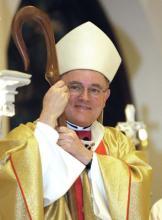
A series of recent developments are renewing questions about the Catholic bishops' alignment with the Republican Party, with much of the attention focusing on comments by Philadelphia Archbishop Charles Chaput, who said he “certainly can’t vote for somebody who’s either pro-choice or pro-abortion.”
In a wide-ranging interview published Sept. 14, Chaput also echoed the views of a number of prominent bishops when he praised Republican vice presidential nominee Paul Ryan for trying to address the “immoral” practice of deficit spending through his libertarian-inflected budget proposals.
"Jesus tells us very clearly that if we don’t help the poor, we’re going to go to hell. Period. There’s just no doubt about it,” Chaput told National Catholic Reporter.
“But Jesus didn’t say the government has to take care of them, or that we have to pay taxes to take care of them. Those are prudential judgments. Anybody who would condemn someone because of their position on taxes is making a leap that I can’t make as a Catholic.”
Chaput stressed that he is a registered independent “because I don’t think the church should be identified with one party or another.” But he said that the Democratic Party’s positions on abortion rights, gay rights, and religious freedom “cause me a great deal of uneasiness.”
He added that economic issues are “prudential judgments” open to a variety of legitimate approaches. Abortion, on the other hand, is “intrinsically evil” and must always be opposed.
That is a talking point voiced by many Catholic conservatives, including Ryan himself. Last Friday, Ryan told the Christian Broadcasting Network that opposition to abortion and same-sex marriage, and support for religious freedom, are all “non-negotiables” for a Catholic politician while “on other issues, of economics and such like that, that’s a matter of prudential judgment.”

Hundreds of thousands of embryos are stored in high-tech storage facilities across the United States. To an increasing number evangelical Christians, that’s hundreds of thousands of babies.
Conservative Christians have long joined hands to oppose abortion, often following the lead of the Roman Catholic Church. But evangelicals are leading the charge in adopting embryos, and encouraging people who have stockpiles of frozen embryos to make them available for adoption.
During a decade-long stretch of federal funding to promote embryo adoption, evangelical organizations received most of the $21 million doled out. That funding was cut in July, but leaders at those organizations say the word is spreading about embryo adoption.
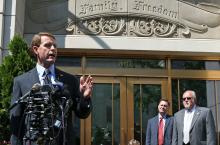
Thank you, Family Research Council, for now conceding what conservative groups have been loath to acknowledge in recent years: the truth that incendiary rhetoric indeed does contribute to a climate conducive to politically motivated violence.
Never has the moment seemed more opportune to forge consensus around an overdue new rule in the culture wars. Starting now, can we all please watch our words?
Most likely, you're aware of the incident that ignited this renewed debate about rhetoric and violence. On Aug. 15, a volunteer from a Washington, D.C., community center for lesbian, gay, bisexual and transgender people walked into the headquarters of the Family Research Council, an influential conservative Christian organization, with a gun, a box of ammunition and a burning grudge against the group and its anti-gay politics and rhetoric, authorities said. The suspect, according to court documents, shot a security guard in the arm before he was subdued by that same guard and taken into custody.
Thank goodness no one was killed and that the security guard acted so heroically to prevent the incident from getting far worse. The group's fiercest opponents in the ongoing national arguments — organizations representing ardent secularists and gay-rights advocates — were quick to condemn the shooting, and rightly so. Conservatives have likewise been clear, for the most part, in their denunciations of violence committed against liberal figures over the years.
Here's where the plot gets thicker.